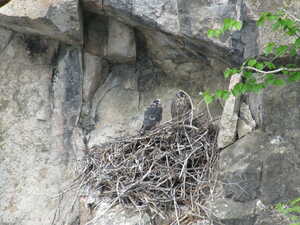Peregrine Falcon Nesting Season Complete
MONTPELIER, Vt. — Hikers and rock climbers can return to Vermont cliffs now that peregrine falcon nesting season has ended.
The Vermont Fish and Wildlife Department, in collaboration with Audubon Vermont, has confirmed that all the young falcons have learned to fly and should not be disturbed by human presence on the cliffs.
"The young peregrines have fledged, and nesting data suggest many of Vermont's falcons had another successful year," said Vermont Fish and Wildlife's nongame bird biologist Jillian Kilborn. "The falcon's nesting success is due to a combination of factors, including good weather early in the nesting season and cooperation from hikers and rock climbers who observe a respectful distance from nesting falcons during this critical period. Peregrine nesting success would not be possible without more than 50 volunteers who monitor the nest sites statewide from March to the end of July."
According to Audubon biologist Margaret Fowle, who coordinates the monitoring effort on behalf of the Fish and Wildlife Department, biologists and volunteers monitored peregrine pairs that occupied at least 45 Vermont cliffs in early spring and summer.
"We greatly appreciate the time and effort volunteers put into monitoring the population this year, and we thank landowners and recreationists for their cooperation in protecting nesting peregrines from human disturbance," said Fowle.
Vermont Fish and Wildlife and Audubon Vermont partner to monitor and protect peregrine nesting sites in Vermont. Peregrine falcons were removed from the state's Threatened and Endangered Species List in 2005. Ongoing cooperation from recreationists and continued monitoring efforts by Vermont Fish and Wildlife and Audubon Vermont will help ensure the peregrine's remarkable recovery in future years.

